We’re looking forward to receiving applications from candidates for two postdoctoral positions here at CiTOS!
By working at CiTOS, the selected candidates will be engaged in a competitive research environment, within a multidisciplinary team including synthetic chemists and chemical engineers. They will enjoy direct access to the most recent flow reactor technologies from Corning AFR and an internal analytical platform (LC, LC-MS, GC, GC-MS, benchtop NMR, IR, UV, etc.). Our large network of industrial collaborators stimulates research toward concrete industrial and/or societal challenges, making this a unique opportunity for candidates aspiring to continue either towards careers in academia or industry.
A first position is open as part of an ongoing collaboration with PENNAKEM, a leader for the production of bio-based solvents and fine chemicals.
A second position stems from an international consortium under the umbrella of the US Food and Drug Administration (FDA). This research program aims at continuous drug substance manufacturing from biomass-derived building blocks. (Eligible candidates for this position must not have spent more than 24 months (for study or research/professional reasons) in Belgium for the past 3 years, regardless of citizenship, and must have obtained their PhD degree within less than 10 years at the time of the application.)
For these position, a PhD in organic chemistry is required, with a background in flow technology and preferably an interest for bio-based chemicals.
Interested candidates please send electronic applications including (a) a cover letter, (b) a curriculum vitae, (c) a short statement on your motivation and career objectives, and (d) the names and contact details of 3 professional references to Prof. Jean-Christophe M. Monbaliu (jc.monbaliu@uliege.be)
Review of applications will begin on January 1, 2023 and will continue until the position is filled.
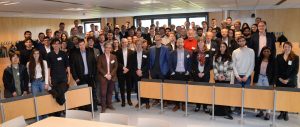 CiTOS was present in the Solvay workshop, April 24-26, 2023! Michele participated, Pauline presented a poster with her most recent results, and JC was an invited speaker for an oral presentation. The entire workshop was characterized by excellent talks discussing some of the most exciting advances in chemistry worldwide. We’re happy to have been part of this event and look forward to developing the new collaborations initiated these days.
CiTOS was present in the Solvay workshop, April 24-26, 2023! Michele participated, Pauline presented a poster with her most recent results, and JC was an invited speaker for an oral presentation. The entire workshop was characterized by excellent talks discussing some of the most exciting advances in chemistry worldwide. We’re happy to have been part of this event and look forward to developing the new collaborations initiated these days.
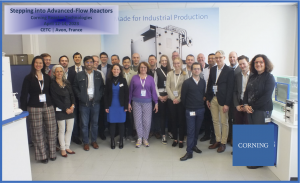 including research in flow chemistry and developments of the Corning Qualified Laboratory hosted here at CiTOS. He also had a chance to present the launching of FlowW4all, a service platform supporting the industry in the effort to incorporate flow chemistry to industrial processes.
including research in flow chemistry and developments of the Corning Qualified Laboratory hosted here at CiTOS. He also had a chance to present the launching of FlowW4all, a service platform supporting the industry in the effort to incorporate flow chemistry to industrial processes.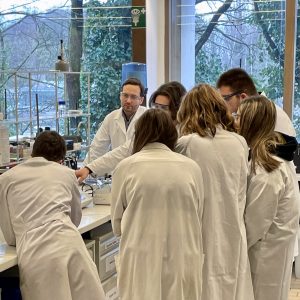 Today CiTOS opened its doors to the participants of the Journée enseignement secondaire at ULiege. Dr. Monbaliu, Loic and Pauline organized a few hours of entertaining explanations about chemistry for our visitors. These young participants had the opportunity to learn about the work done here at CiTOS and explore our laboratories during both morning and evening sessions.
Today CiTOS opened its doors to the participants of the Journée enseignement secondaire at ULiege. Dr. Monbaliu, Loic and Pauline organized a few hours of entertaining explanations about chemistry for our visitors. These young participants had the opportunity to learn about the work done here at CiTOS and explore our laboratories during both morning and evening sessions.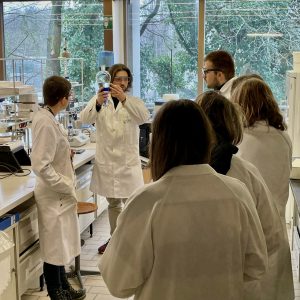
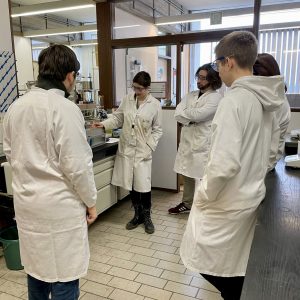
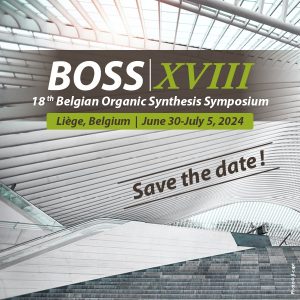 We continue to work hard at CiTOS to make the 18th BOSS symposium a week to remember! Speakers are confirmed, additional sponsors and funding is arriving, cultural and social events are being explored… There is always something new on the table! You can take a look at the flyer
We continue to work hard at CiTOS to make the 18th BOSS symposium a week to remember! Speakers are confirmed, additional sponsors and funding is arriving, cultural and social events are being explored… There is always something new on the table! You can take a look at the flyer 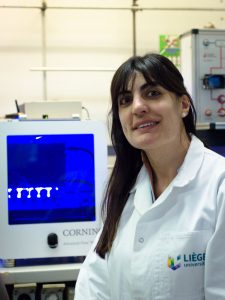 2023 at CiTOS began with the visit of Dr. Gabriela Oksdath! Gabriela is a researcher at the Universidad Nacional de Cordoba (Argentina). Her research interest includes the development of greener, scalable and innovative approaches to prepare compounds of interest. She specializes in combining different types of catalysis (Photocatalysis, Metal Catalysis, Biocatalysis) under homogeneous or heterogeneous conditions.
2023 at CiTOS began with the visit of Dr. Gabriela Oksdath! Gabriela is a researcher at the Universidad Nacional de Cordoba (Argentina). Her research interest includes the development of greener, scalable and innovative approaches to prepare compounds of interest. She specializes in combining different types of catalysis (Photocatalysis, Metal Catalysis, Biocatalysis) under homogeneous or heterogeneous conditions.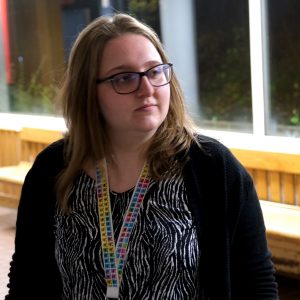 Elyse worked along side Pauline on the preparation of nitrosoarenes from aniline derivatives. After optimization of the batch procedure, a flow system was established allowing the scalable preparation of the compounds. With the help of computations, a comparison could be established between the oxidation potential of the compounds and the reaction temperature.
Elyse worked along side Pauline on the preparation of nitrosoarenes from aniline derivatives. After optimization of the batch procedure, a flow system was established allowing the scalable preparation of the compounds. With the help of computations, a comparison could be established between the oxidation potential of the compounds and the reaction temperature.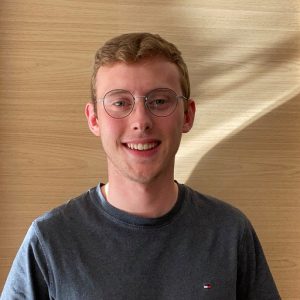 Furthermore, he demonstrated the applicability of the synthesized N-nitroso glycine for the preparation of syndones. In collaboration with Claire, CO2 was used to produce glycerol carbonate from glycidol. His contribution was especially significant for the computational work of the project.
Furthermore, he demonstrated the applicability of the synthesized N-nitroso glycine for the preparation of syndones. In collaboration with Claire, CO2 was used to produce glycerol carbonate from glycidol. His contribution was especially significant for the computational work of the project.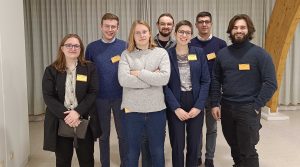 CiTOS was well represented this year at the annual Merck Organic Chemistry Symposium (MOCS), at Blankenberge. Our work was shared with the Belgian science community through six poster presentations and an oral presentation by Pauline Bianchi. We are very proud of the CiTOS committee and hope to be back next year to share more science!
CiTOS was well represented this year at the annual Merck Organic Chemistry Symposium (MOCS), at Blankenberge. Our work was shared with the Belgian science community through six poster presentations and an oral presentation by Pauline Bianchi. We are very proud of the CiTOS committee and hope to be back next year to share more science! It is again time for goodbyes, and this time it is Romain (“Romodo”) who is off! Dr. Morodo will be taking up a postdoctoral position in the lab of Prof. Robert M. Waymouth at the University of Stanford, with the support of the prestigious postdoctoral fellowship from the Belgian American Education Foundation (
It is again time for goodbyes, and this time it is Romain (“Romodo”) who is off! Dr. Morodo will be taking up a postdoctoral position in the lab of Prof. Robert M. Waymouth at the University of Stanford, with the support of the prestigious postdoctoral fellowship from the Belgian American Education Foundation (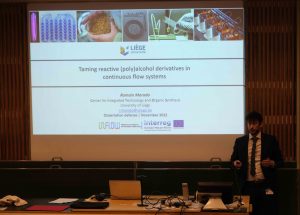 “Taming reactive (poly)alcohol derivatives in continuous flow chemistry”. Romain’s work was part of the IN FLOW R&D project involving 4 cutting-edge partners from the Euregio Meuse-Rhine for the formulation, characterization and engineering of biochemical products.
“Taming reactive (poly)alcohol derivatives in continuous flow chemistry”. Romain’s work was part of the IN FLOW R&D project involving 4 cutting-edge partners from the Euregio Meuse-Rhine for the formulation, characterization and engineering of biochemical products.